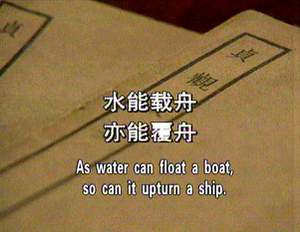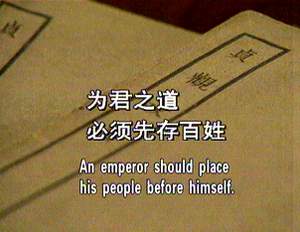 |
 Emperor Tai Zong of the Tang Dynasty (618-907) was an emperor of wisdom and foresight in Chinese history. His exceptional political endeavors laid the foundation for the prosperity of the Tang empire, enabling ancient China to reach a new height in politics, economics and culture. Emperor Tai Zong of the Tang Dynasty (618-907) was an emperor of wisdom and foresight in Chinese history. His exceptional political endeavors laid the foundation for the prosperity of the Tang empire, enabling ancient China to reach a new height in politics, economics and culture.
Emperor Tai Zong, named Li Shimin, fought with his father as a boy. During peasant uprisings by the end of the Sui Dynasty (581-618), he showed his military talents by conquering men of power. He successfully waged the Xuanwumen Incident to win in vigorous court struggles and succeeded the throne.
After his ascension, he confronted harsh domestic environment. After many years of war, large stretches of fields lay wasted, population decreased. Society was unstable. Realizing his lack of experience and knowledge in running a country, he often discussed state matters with his ministers and summed up experiences of success and failure of past dynasties. They realized that "as water can float a boat, so can it upturn a ship," and pointed out that "a ruler should put his people before himself." They learned an important lesson from the rapid fall of the once powerful Sui Dynasty. Emperor Tai Zong and his ministers realized that while building up the country or going into war, they must not burden the empire and the people too hard. They laid down the principle of decreasing conscript labor and taxes to improve the life of the people.
To achieve long term peace and stability they made reformations to correct previous rulers' mistakes and took pains to build up a strong country.
Emperor Tai Zong disapproved that emperors should be arbitrary in all matters big and small. He laid down regulations for political matters to be discussed by departments concerned before submitting to the prime minister and then for final approval by the emperor. He also improved the organizational setup.
Emperor Tai Zong accepted Wei Zeng's suggestion that "A person should listen to both sides to be enlightened. One would be benighted when he heeds only one side." He encouraged his ministers to criticize him to his face. He took remonstrance officials seriously and required their presence when the prime minister discussed state matters with him, so as to get their supervision and criticism in time.
 Emperor Tai Zong also adopted Confucius' theory of not demanding perfection from the people he used but exploit their strong points. He picked virtuous men to head his departments. Emperor Tai Zong also adopted Confucius' theory of not demanding perfection from the people he used but exploit their strong points. He picked virtuous men to head his departments.
After he suppressed turmoil at the northern borderland, he carried out a policy of uniting the nationalities and was looked upon as their ruler too.
Together with his ministers, Emperor Tai Zong succeeded in creating a favorable political environment rarely seen in ancient feudal society. His reign Zhenguan was a successful reign in Chinese history.
A favorable society guaranteed social stability and rejuvenation of economics and culture. There were many records of the people's happy life in history books. "Annals of Politics in Zhenguan" records: "Traveling in the wilderness, merchants see no robbers or thieves. Prisons are empty while cattle roam the land."
Emperor Tai Zong attached great importance to education. He built schools and enlarged enrollment. Korea, Paekche and Silla sent students to study at Chang'an. During this period, calligraphy, painting, music and dancing made great progress on the basis of what had been in the Sui Dynasty. The Tang Empire became the most civilized and prosperous country in the world.
|
|
|
|
|
|
|
 |









